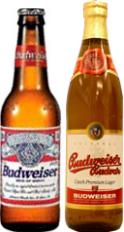 |
 |
|

|
|

|
 |
home
about
Protz
features
A-Z
books
|
|
Protz:
features
reviews
tastings
news & events
books
|

| |
No Fibs: well done Heineken
by Willard Clarke, 12/05
Heineken recorded a remarkable sales boost of 29% in Britain in the first half of 2005, a sure sign that its move to sell its genuine 5% Dutch beer in Britain is meeting with consumer approval.
For decades, the Heineken sold in Britain was brewed under licence by Whitbread and, at 3.6%, scarcely registered on the lager Richter scale. Then in 2003 the Dutch giant took the momentous decision to stop
brewing in Britain and to export its beer from its brewery in the Netherlands. Heineken also became a signatory to a new organisation called NoFibs - National Organisation for Imported Beers - that was set up
by brewers and importers of European lager beers produced in their places of origin.
|
|

|
Heineken�s membership of NoFibs raised a few eyebrows. The Dutch brewer, with its global presence, brews more beer than the rest of NoFib�s members put together. But Heineken not only needed street credibility for its imported beer strategy but also wanted to win a skirmish in its long-running battle with Inbev�s Stella Artois. They are the two major premium lager brands in Europe and are making inroads into the vast Russian and Baltic beer markets. For the important British market, Heineken was keen to stress that its beer is authentic and Dutch, unlike the Stella brewed in Britain. It was happy to join forces with the Czech brewer Budweiser Budvar, one of the driving forces behind NoFibs. Budvar promotes the fact that its premium lager is brewed only in Ceske Budejovice, unlike the 'American' Budweiser produced in a rented plant in London.
The Heineken strategy has been backed by expensive TV commercials that show a baffled Londoner being taken to the Netherlands and shown round the Heineken brewery where, he is told, the beer is not only stronger but is matured in horizontal tanks. This technically obscure piece of information is a dig at the likes of Pilsner Urquell, where maturation has been moved in recent years from horizontal to conical vessels: purists argue that a slower fermentation in horizontal tanks produces a better flavoured beer.

|
|
Cynics may argue that the success of imported Heineken is due to its increased strength. But authenticity and traditional brewing methods have also played a part.
A survey by NoFibs shows that three out of
10 drinkers do care where their beer is brewed and were even prepared to pay more for imported lager over brands brewed under licence in Britain.
The survey also underscored the confusion in the British lager market:
most drinkers thought Stella Artois was a French beer, Kronenbourg and Grolsch were both German, while Beck�s and Budweiser Budvar were American.
|
NoFibs has struck a chord among beer drinkers. Most are clearly happy to down any pale liquid, regardless of where it is brewed. But more discerning lager drinkers do care about authenticity. They are making common cause with cask beer drinkers, who are moving to beers made by smaller, independent brewers rather than the heavily-hyped brands produced by the national giants, who confuse consumers by making bitters in both cask-conditioned and nitro-keg form.
|
|
home
about
Protz
features
A-Z
books
|